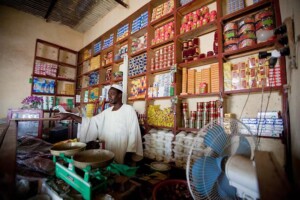Sudan Finance Ministry expects no ‘external support’ for 2023 budget
The Minister of Finance and Economic Planning, Jibril Ibrahim, expects that the country’s budget for 2023, like the current year’s budget, “will be devoid of external support”. Last week, he pointed to the importance of expanding industrial mining and increasing the agricultural production, for Sudan to become self-sufficient in the future.
 Finance Minister Jibril Ibrahim meets with Mubarak Ardol, director of the Sudanese Company for Mineral Resources, August 22 (SUNA)
Finance Minister Jibril Ibrahim meets with Mubarak Ardol, director of the Sudanese Company for Mineral Resources, August 22 (SUNA)
The Minister of Finance and Economic Planning, Jibril Ibrahim, expects that the country’s budget for 2023, like the current year’s budget, “will be devoid of external support”. Last week, he pointed to the importance of expanding industrial mining and increasing the agricultural production, for Sudan to become self-sufficient in the future.
During his visit to the Sudanese Company for Mineral Resources last Monday, Finance Minister Jibril Ibrahim emphasised the importance of mining proceeds for Sudan’s national income, and expressed his doubts about foreign support for the budget of next year.
He stressed the role of the Sudanese Mineral Resources Company, chaired by Mubarak Ardol, in supporting the national economy and supplementing the state treasury by providing “real revenue sources,” the Sudan News Agency (SUNA) reported on Wednesday. The minister urged the company to further develop performance to play its role in advancing economic development in the country.
Ibrahim pointed to the importance of the private mining sector “if it is controlled and regulated”. He expressed the government's interest in expanding industrial mining done in a safe way, and called on the Mineral Resources Company to supervise the other mining companies' work and to deal firmly with anyone who violates the law.
Two days before, the Finance Ministry tweeted that Minister of Minerals Mohamed Bashir Abu Numou expressed his ministry’s “keenness to address all challenges facing the mining sector with the aim of developing, modernising, and increasing the sector’s contribution to economic growth and the provision of job opportunities”.
In April, the Finance Minister said that without external financial support, Sudan is able to cover the country's current expenditure this year. There are difficulties however in implementing development projects and the Juba Peace Agreement, including the return of refugees and displaced people to their places of origin in conflict zones.
The government of PM Abdallah Hamdok of which most members, not Ibrahim, resigned following the coup d’état on October 25 last year, did not receive external funds for it 2022 budget. It succeeded however, in securing at least $4,364 billion in aid from the international community, including the World Bank, for 2023. Yet, these funds were frozen following the coup.
Sudan is the second largest gold producer in Africa. The production however is often driven by unregulated, artisanal (individual subsistence) mining, and routine gold smuggling across international borders is a constant problem. Estimates are that between 50 and 80 per cent of Sudan’s gold is smuggled out of the country. It is also known that proceeds have been used to finance internal conflicts.
In an extensive report published in end July, CNN accused the Sudanese military rulers of letting Russia “plundering gold in Sudan to boost Putin's war effort in Ukraine”.
On August 21, Radio Dabanga reported that Sudan offered more oil blocks to a Russian oil company. During a three-day visit of a high-level Sudanese government delegation to Moscow., the two countries also agreed to enhance cooperation and expand trade in several other sectors, including Sudanese-Russian “cooperation in the agro-industrial complex”.
Agriculture
A few days later, Ibrahim also called for increased agricultural production.
During his address to a session of the Arab Food Security Initiative, supported by the League of Arab States, in Khartoum on Saturday, he acknowledged his country’s “inability to accurately report on Sudan’s available resources and the challenges of their optimal exploitation”, and called on “scientists and experts to contribute to providing accurate figures on water quantities and soil types.
“There is a need to direct our sources to invest in and motivate the private agricultural sector [..] and to develop policies that enable increased production and control the markets so that we will not need to import food from abroad anymore, and become self-sufficient.” he said. “In this way, Sudan will be able to climb high in the list of food secure countries.”
Jibril further noted the importance of addressing infrastructure problems such as electricity, roads, railways, silos, laboratories, and warehouses, and of providing vaccinations for livestock. “Production inputs can be provided locally to reduce costs and ensure the required supply and production.”
On Wednesday, a group of Turkish companies and the Board of Directors of El Gezira Agricultural Scheme signed a partnership contract on agricultural production items, such as seeds and machineries.
The Ministry of Finance Undersecretary for Economic Planning Mohamed Bashar praised the economic cooperation between Sudan and Turkey in all fields, and said he hoped that cooperation between the two countries in the agricultural and industrial fields will reach “broader horizons”.
He explained that the Turkish partnership with the El Gezira Agricultural Scheme would lead to an “agricultural renaissance in Sudan”, and expressed his ministry's readiness “to provide all facilities to complete the Turkish partnership with Sudan”.
Earlier this month, Sudanese farmers said that the great challenges they are facing may lead to the failure of the current agricultural season. The biggest challenges are the devaluation of the Sudanese Pound and the high inflation, the sharply decreased funding by the government, and the related shortages of fuel, electricity, fertilisers, and pesticides.
Farmers in El Gezira said in June that “if the situation continues in this way, there will be no cultivation anymore in El Gezira”.
According to the UN Office for the Coordination of Humanitarian Affairs (OCHA) in Sudan, almost a quarter of Sudan's population (11.7 million people) is estimated to be facing acute food insecurity between June and September.
United Arab Emirates
A delegation headed by Minister Ibrahim left for the UAE yesterday for a three-day visit to learn about the Emirati experience in port management and to complete consultations on the establishment of the Abu Emama port on the Red Sea coast.











 and then
and then